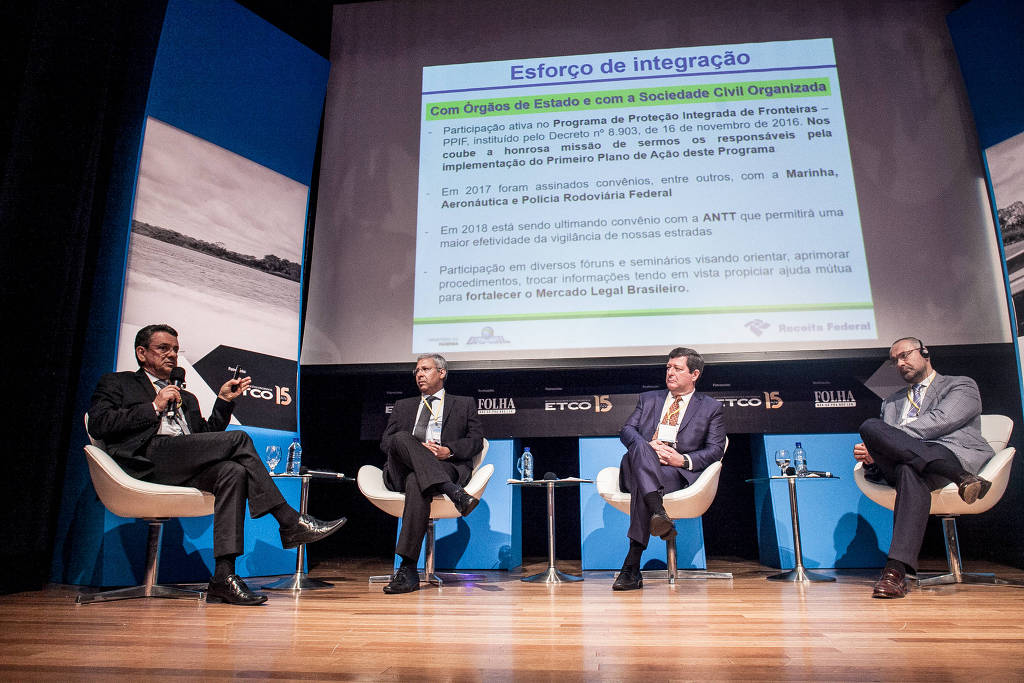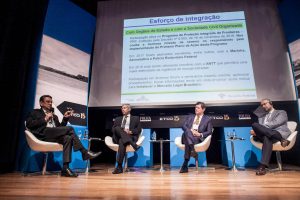Communication between control bodies is essential to curb illegal trade

Expert explains the connection between smuggling associations in Latin America and terrorist organizations
The integration and reinforcement of communication between different organizations to combat smuggling and illegal trade, in Brazil and
in other countries, they are the main way to successfully curb the practice of these crimes, which, in some cases, are linked to terrorist actions abroad.
This was one of the conclusions of experts who debated the topic during the seminar on Security and Development, organized by Folha, sponsored by the ETCO Institute (Brazilian Institute of Competitive Ethics), this Tuesday (20th), at the theater of the Centro de Eventos Brasil 21, in Brasília. The debate was mediated by Folha journalist Fernando Canzian.
According to the deputy secretary of the Federal Revenue Service, Paulo Ricardo Cardoso, combating these highly organized crimes is an important step towards improving the business environment in the country and helping to ensure agility in the flow of foreign trade.
“Today the volume of seizures is growing. The more you learn, the more you have contraband. We get the impression that we are mopping the floor with the tap running ”, he said.

INTELLIGENCE ACTIONS
Despite praising the federal intervention in Rio de Janeiro, Cardoso said that it will not solve the problem of crime and that the only way to combat it is by promoting incentives for investigative intelligence actions and an increasing integration of national and international research institutions. combating smuggling.
“Weeks ago a large arms dealer in the USA was arrested, who sold to Brazil. We arrived at it through the integration of the Brazilian and American intelligence structures. This is what reinforces the fight against these crimes ”, he said.
For ETCO President Edson Vismona, strengthening the communication mechanisms and bringing information closer to the intelligence agencies is the most effective and least expensive way to stop smuggling. He defended the creation of a Latin American alliance against this type of crime and also a greater engagement of civil society, requesting and
supporting measures in the area. “Evil makes connections, unites, interacts, so we have to do the same. Otherwise, cities and citizens are the ones who suffer the consequences of these crimes, ”he said.
TERRORISM
Emanuele Ottolenghi, senior member of the FDD (Foundation for Defense of Democracies, institute for producing strategic knowledge on national security), commented on the link between smuggling organizations in Latin America and terrorist agencies.
He gave as an example an American criminal association that joined the Mafia in Calabria, Italy, to smuggle cocaine from Colombia into the European market. Among those arrested in the smuggling network, according to Ottolenghi, only one was not from the American criminal organization or the Italian mafia.
“There was a Lebanese, who lived more than a thousand kilometers from southern Italy. He was the man responsible for receiving, laundering the money and redistributing it to drug dealers in Colombia, ”he said.
“Why call on a foreigner, who was not part of either side of the business, to manage the most sensitive part of the transaction? The reason is that he worked for Hezbollah, a terrorist organization that has a global network capable of laundering money and handing it back to the criminal cartel, taking 20% of the profit. ”
Also according to Ottolenghi, in Latin America, smuggling does not always exploit only the geographical weakness of national borders, but also the structural corruption of the people who control them, making payments to judges and authorities to facilitate the passage of the goods.
He stated that, in addition to financing terrorism, it is necessary to be concerned about smuggling because it is what allows criminal unions to operate within Latin American countries like Brazil and Paraguay, leading indirectly to the escalation of violence in the region.
DRY THE TAP
One of the main ways to curb smuggling and money laundering is to suppress the financial sources of these organizations, according to the director of intelligence at Coaf (Council for the Control of Financial Activities), Antonio Carlos de Sousa.
“You can only arrest the bandit, but he will get out of there rich. It is necessary to break down criminal associations economically, ”he said.
In the case of Brazil, Sousa defended the creation of a national strategy to combat money laundering and corruption, emphasizing the important role of the economic sector in the initiative.
One action that Sousa cited as fundamental was the obligation for banks to automatically communicate to Coaf more information on cash withdrawals made above R $ 100 thousand. In December 2017, this amount dropped to R $ 50 thousand.
"When you suppress that payment, these organizations will feel the blow," he said.
Source: Folha de São Paulo (20/03/2018)



